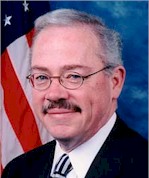
Rep. Barr Encourages Privacy Advocates to Deluge Congress
(April 6, 1999) Rep. Bob Barr encouraged privacy advocates who gathered for the Computers, Freedom & Privacy 1999 conference to deluge Members of Congress "through cards, postcards, e-mails, letters, faxes, phone calls, whatever it takes, personal visits, to make sure that these issues rise to the level of being on the radar screen of Members of Congress." Rep. also stated that he wants Congressional hearings on Project Echelon.
| See also, complete copy of Rep. Barr's address. |
Rep. Bob Barr (R-GA) spoke at the annual Association for Computer Manufacturing conference in Washington DC on Tuesday afternoon, April 6. The title of the conference this year is "Computers, Freedom & Privacy 1999." He was the lead speaker on a panel titled "The Creation of a Global Surveillance Network."
Rep. Barr is a former CIA analyst and federal prosecutor who is now one of the leading advocates in the House of Representatives for limitations on government authority, including law enforcement powers and surveillance. Since 1990, he has represented the 7th District of Georgia, which includes western suburbs of Atlanta, and about ten counties in northwestern Georgia. He sits on the Judiciary Committee and the Government Reform and Oversight Committee.
 |
|
Barr delivered a sweeping review of American history, in which he said that in the past land, natural resources, and capital were the most important assets. However, he predicted that in the 21st Century the most "valuable asset is information." Rep. Barr is concerned about the "gathering or misuse of privacy information, or information that is otherwise private, on American citizens."
Barr stated that protecting privacy requires Congressional action. "So, as we look to Congress to help us to find as a people the parameters of how we deal with that very very precious commodity, and that is, information, and with it the concept of privacy for that information, there is indeed a role for Congress."
Rep. Barr warned that it is important for Congress to act quickly on privacy. "Otherwise, it may reach the point that it does not matter what we do in the future. A mechanism and mechanisms will be in place that will make it virtually impossible to regain any semblance of privacy rights with regard, either domestic, or internationally transmitted, information."
The issue of privacy rights "rarely captures the headlines in a way that, in and of itself, motivates Members of Congress to do something about it," said Rep. Barr. "Therefore, it is very very difficult to get members interested in it beyond simply signing one letter at best." The solution, he said to motivate their constituents to contact them.
Rep. Barr warned that a few legislators could do little on this issue unless the public becomes involved. Rep. Barr made the following recommendation:
"Hard work. Repetitive work. Bringing these to the attention of Congressional and executive branch officials, to the Internet, to the media, through cards, postcards, e-mails, letters, faxes, phone calls, whatever it takes, personal visits, to make sure that these issues rise to the level of being on the radar screen of Members of Congress not predisposed to pay attention to them ..."
Rep. Barr recounted two successes for privacy interests in the 105th Congress. These were the stopping, at least temporarily, of the FDIC's "know your customer" program, and the "national ID card." He attributed these victories to public involvement.
In contrast, he said the one major failure for privacy interests was the granting of authority for "roving search warrants." He said that this was enacted because its opponents had no time to build up public opposition. He said:
"... with regard to the roving wiretaps, we had been successful for about four years in stopping the expansion, that expansion, of roving wiretap authority. And, it, at the very end of the session last year, through concerted effort by Republicans, certain Republican members, the legislation, the authorization for expanding roving wiretaps, was slipped into an intelligence authorization bill, with no hearings, with no public input, with no opportunity other than a last minute effort ..."
Barr also offered other strategic advice for protecting privacy rights in the political process. "It will require more than simply legislation," said Barr. "It will require oversight."
He also stated that "these topics don't break down any longer neatly along party lines." Hence, privacy advocates should work on a bipartisan basis.
Rep. Barr was the lead off speaker on a panel dedicated to global surveillance. Rep. Barr also discussed one of the governmental global surveillance programs -- Project Echelon. This is a U.S. and United Kingdom led global surveillance program, about which there is little public information.
Rep. Barr stated: "I have also today asked for hearings to be conducted in this session of Congress, not simply on the Project Echelon, but on what it represents, in all of its parameters, not just the security, or lack of security, with regard to international communications, but domestic communications, the privacy of domestic communications, Internet communications, telephone communication, wire transfers, and so forth, which frequently, as we have seen over the years, with regard to the intercept of domestic wire transmissions, for example, pursuant to court orders, the line between interstate and intrastate is sufficiently blurred that it no longer has any meaning."
The other members of the panel were: